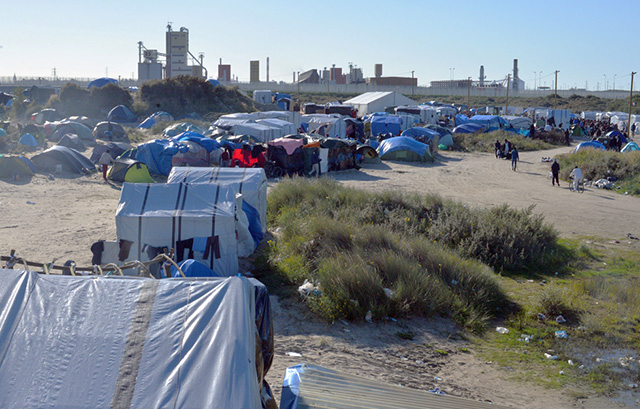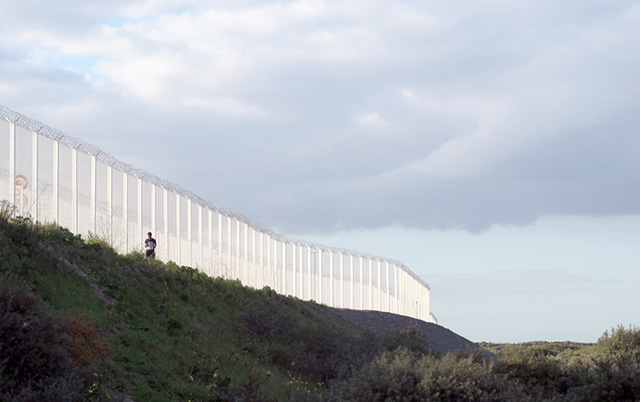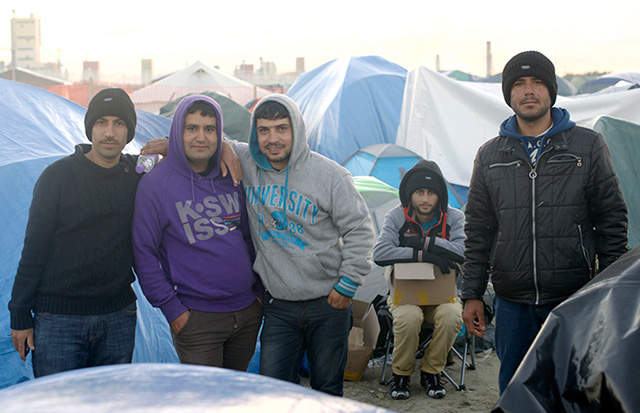Bordering the English Channel, on the outskirts of the French town of Calais, an estimated 5,000 men, women and children live in a sea of tents and shelters sprawling across the former dumping ground of an industrial plant. The described area is home to one of the biggest refugee and migrant camps in Western Europe, and is populated by communities from Afghanistan, Chad, Egypt, Eritrea, Ethiopia, Iran, Iraq, Kurdistan, Libya, Pakistan, Palestine, Somalia, Sudan, Syria and other nations.
 The “Jungle” refugee camp in Calais, France, in September 2015. (Photo: Peter Blodau)
The “Jungle” refugee camp in Calais, France, in September 2015. (Photo: Peter Blodau)
The camp, known today as “the Jungle,” has been active in various formations and sizes near Calais since 2001. And, as The Intercept reported in December 2015,the French and British governments’ approach to the informal settlement has included pouring “millions of dollars into extra riot police, tear gas canisters, dogs, fences, infrared cameras, floodlights, and batons” to deter Jungle residents, “while neglecting to supply adequate meals, sanitation, running water, housing, medical support, or clothing.”
The countering of governmental hostilities toward the camp hasn’t come from the UN, UN High Commissioner for Refugees (UNHCR), Oxfam, Save the Children, Red Cross or most other major aid agencies, but rather from grassroots organizations like L’Auberge des Migrants and Help Refugees, as well as independent volunteers (see “Caravans for Calais”) from across Europe.
In sum, the Jungle is haunted by a shameful imbalance of power: Volunteers unload food parcels inside the camp while “a bunch of migrants” queue, and since the powers that be prioritize containment and deterrence, French police officers armed with riot-control weapons watch them in the distance.
Bulldozing a Sea of Homes
In mid-January, the French government issued an ultimatum to Jungle residents: Bulldozers will level a third of the makeshift encampment and thereafter, the evictees are to be relocated to a neighboring purpose-built facility.
Feeling unheard – residents told the Guardian that the new site “resembles a prison and contains no communal areas” – camp leaders quickly released an announcement of their own: “We, the united people of the Jungle, Calais, respectfully decline the demands of the French government with regards to reducing the size of the Jungle. We have decided to remain where we are and will peacefully resist the government’s plans to destroy our homes.”
Despite protests, bulldozers guided by riot police moved in on January 18. “In our view, it’s not in the interest of the refugees,” said Tanya Freedman of Help Refugees, “because communities are being split apart.”
Evidently, the calls of the united people are known, but the powers that be continue to prioritize containment and deterrence.
 A double-fenced road near the refugee camp. (Photo: Peter Blodau)
A double-fenced road near the refugee camp. (Photo: Peter Blodau)
In our recent essay, “A Sea of Tents Surrounds Me” for the Los Angeles Review of Books, we described the logic behind most residents’ stay in the camp:
Proximity is the Jungle’s promise: that is, the chance of illegal entry into England via the Channel Tunnel or port of Calais, for the sake of a future spent with family, friends, jobs, asylum, or the English language. But the camp’s promise is also that living there is the lesser of two struggles: that coming under the teargas fire of the French police beyond Jungle limits or being detained for hiding among the crates within cargo trucks set to cross the Channel is less severe than, say, facing an Islamic State siege or a bombing campaign by the Syrians, the Russians, or the American-led coalition at home.
In other words, “It’s the logic of life against the logic of the state,” according to one of our friends Jean Colombain, who is an archivist and French citizen with Lebanese parentage.
Carrying the Load of “No Money, No Future”
In Carry That Load, which was filmed by Blodau in the fall of 2015, we allude to the ongoing escape of thousands of people living in the Jungle – not to mention the hundreds of thousands more across Europe – from the perils of poverty, abusive regimes, proxy war, continuous war, climate change and the refugee camps themselves.
The stories of two Jungle residents in particular, Salah from Rojava (Western Kurdistan) and Abdo from Darfur, Sudan, inspired our correlation between the double-fenced road passing alongside the camp and the makeshift place of worship left behind. In the quotations that follow, which we previously shared in our essay in the Los Angeles Review of Books, Abdo conveys the psychological and spiritual loads that he carries, and Salah details the occasion in which a transport load might one day carry him.
 Salah (center) with friends from Rojava. (Photo: Peter Blodau)
Salah (center) with friends from Rojava. (Photo: Peter Blodau)
Salah: “I was an English teacher in Kobani, but I had to leave because of the fighting. I went to Greece by boat and then by train to Hungary. I ended up in Germany but my family is in England and I speak English well, so that’s why I’m here now. I still can’t believe I’m living in a tent with no money. A sea of tents surrounds me.”
Accordingly, he relates another one of his escapes, this time from the Jungle itself:
I tried to get to the fences of the [Eurotunnel terminal]. We walked from the camp and through Calais. On our way we saw the trucks that get unloaded at the trains. We had a pair of fence cutters with us to make a hole. There are old holes that don’t get closed up, so we looked for those too. We waited for it to get dark. There were police and dogs on both sides of the fence that weren’t leaving, though. We went back to the camp and would try another day.
 Abdo outside his current home. (Photo: Peter Blodau)
Abdo outside his current home. (Photo: Peter Blodau)
Abdo: “I have no money, no future. Reading [the Qur’an] gives me peace … it takes me away from here.”
Hearing the Calls of the United People
With degrading politics both at home and away, the Jungle residents have been left with few answers, turning mainly to prayer and further smuggling. As for the French government, clearing the ground (and consequently splitting communities apart) has topped its agenda, which essentially carries forward a cruel history of control spreading over a number of continents for centuries.
Carry That Load was written and produced by Elle Kurancid, and uses video footage shot by Peter Blodau, who interviewed and sketched portraits of Abdo, Salah and over two dozen Jungle residents in August and September 2015.
Defying Trump’s right-wing agenda from Day One
Inauguration Day is coming up soon, and at Truthout, we plan to defy Trump’s right-wing agenda from Day One.
Looking to the first year of Trump’s presidency, we know that the most vulnerable among us will be harmed. Militarized policing in U.S. cities and at the borders will intensify. The climate crisis will deteriorate further. The erosion of free speech has already begun, and we anticipate more attacks on journalism.
It will be a terrifying four years to produce social justice-driven journalism. But we’re not falling to despair, because we know there are reasons to believe in our collective power.
The stories we publish at Truthout are part of the antidote to creeping authoritarianism. And this year, we promise we will kick into an even higher gear to give you truthful news that cuts against the disinformation, vitriol, hate and violence. We promise to publish analyses that will serve the needs of the movements we all rely on to survive the next four years, and even build for the future. We promise to be responsive, to recognize you as members of our community with a vital stake and voice in this work.
Please show your support for Truthout with a tax-deductible donation (either once today or on a monthly basis).